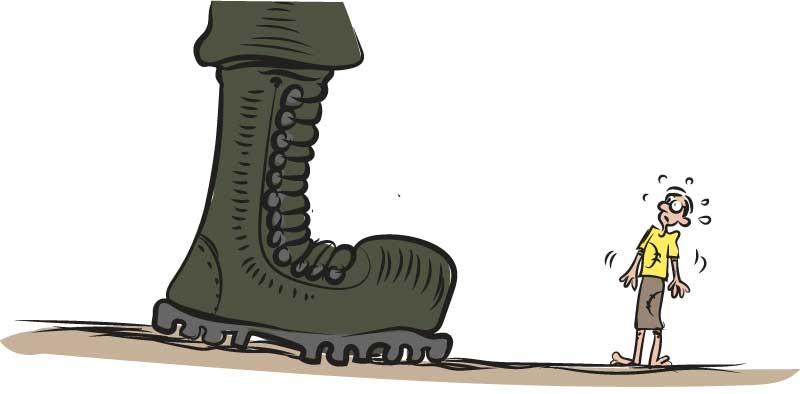Reply To:
Name - Reply Comment

Various versions have been floated by variously interested groups over the sudden heavy presence of police and army in Colombo since Friday covering the whole weekend. The failure on the part of various parties responsible for the security of the country to speak in one voice in this matter has raised suspicion about the motive of the government for this sudden move.
Police Spokesman, SSP Nihal Thalduwa had said that security had been heightened in Colombo due to an ‘unspecified intelligence information’ while the military said it was only a routine rehearsal. Another rumour did its rounds claiming that a leader who was deposed during the peak of the last year’s Aragalaya was to take over powers again. A fourth version that was floated on Sunday said that the heavy presence of special Task Force Commandos, riot squads and contingents of women constables followed a false alarm based on an unusually large lunch order placed at the Colombo University canteen.
One website said intelligence units had picked up information that “the university canteen had received an order for 1,500 lunch packets on Friday. This was (mis) interpreted as a mass gathering against the government. Some 500 freshers had been invited to the university for the arts department celebration and they expected most of them to be accompanied by parents or siblings and hence the order for 1,500 meals of bread, pol sambol and one curry.”
In the light of the authorities concerned having not explained what was going on, one has to rely on such stories. But, if food order was the case, the whole episode seems to be amusing. If the “intelligence units” were able to pick up the information that an unusually large food order had been placed, were they not able to find out who the person or persons placed the order were and what the reason was?
Whatever the reason for the sudden beefing up of security in the city had been, it instilled fear and anxiety in the minds of millions of people living in the city and those who come to the city. How many people might have cancelled their visits to the city to fulfill their needs, some of them might have been medical emergencies, due to this sudden presence of large number of security personnel?
The incident reminds us the Sinhala folk story of a farmer who had to sacrifice even his own life for his shortsighted false alarms. The story had it that the farmer who was in his chena shouted on several nights claiming that a tiger had come. When the fellow farmers in the adjacent chenas rushed to his assistance the man started to tease them. When a tiger actually came to his chena one day, nobody came to his rescue, despite his desperate cries. His false alarm had led others to drop their guard. Similarly, if the people do not know the reason for a heavy deployment of police and army personnel, people might be insensitive to such actions in the future, which might sometimes catastrophic.
The incident also runs counter to the argument of the leaders of the government that tension in the country, especially in the Capital city would discourage the foreign tourists from visiting the country. However, uncertainty is worse than a tense situation where one can understand what is going on.
The government seems to be panic-stricken by the last year’s protests and is so hell-bent on crushing any dissent that even when a lone person walked on the road carrying a National Flag recently, a whole contingent of police rushes to the scene and surrounded him to stop him. Earlier when two women walked on the Galle Road towards Colombo too faced a similar police contingent that prevented them from proceeding. The government can thus suppress dissent using police and armed forces but such suppressions will only result in more resentment accumulating among the people.
President Ranasinghe Premadasa ruled the country with an iron fist but his party, the United National Party (UNP) suffered a humiliating defeat at the next Parliamentary and Presidential elections in 1994, after his assassination by the LTTE on the May Day of 1993. His death at least should have led to a sympathy wave, but the memory of various death squads and vigilante groups that were marauding during his tenure prevented it.
What the authorities have not realized is that it is the cause that has to be removed if they want to remove the effect. They must find a way to strike a balance between allowing dissent and protecting the democratic institutions.